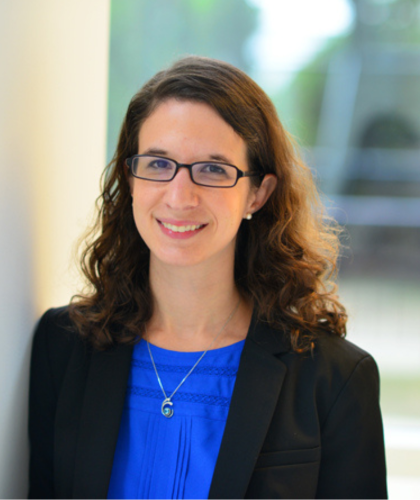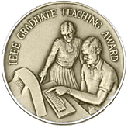News Story
Goldberg Receives Provost’s Professional Track Faculty Excellence Award in Teaching

On April 29, University of Maryland Professional Track Faculty member Deborah Goldberg was selected for the Provost’s Excellence Award in Teaching, awarded for outstanding contributions and accomplishments in teaching and exemplary dedication to students.
“I am incredibly honored to be recognized for excellence in teaching at the campus level through the Provost's Award for Professional Track Faculty,” says Goldberg.
An instructor at UMD for the past eight years, Goldberg is currently a Senior Lecturer in the Fischell Department of Bioengineering (BIOE), having joined the department in Fall 2023. In her first semester with BIOE, she earned the Instructional Impact Award, nominated by students in both of her courses including BIOE331: Biofluids and BIOE489T: Biopharmaceutical Process Development & Manufacturing.
“Dr. Goldberg embodies the essence of teaching excellence, consistently surpassing the highest standards in her educational endeavors,” says BIOE Chair John P. Fisher, who nominated Goldberg for the award. “Her passion for innovative teaching, commitment to student success, and dedication to advancing the field of education make her an exemplary candidate for the Provost’s Award for Professional Track Faculty.”
Prior to her role in BIOE, Goldberg taught for seven years in the Clark School of Engineering’s Department of Chemical & Biomolecular Engineering. A Maryland Engineering alumna, she earned her B.S. in chemical engineering in 2006 and her Ph.D. in bioengineering in 2010.
Between her time as a student and a lecturer, Goldberg worked as a scientist in Formulation Sciences at MedImmune (now AstraZeneca) from 2010 to 2016.
“This industry experience was invaluable and has had a significant impact on my teaching,” explains Goldberg. “It has enabled me to bring industry-relevant content to my biopharmaceutical process development course and to incorporate industry-relevant skills including experimental design, data analysis, and decision making in my courses.”
“My top priority is to support students on their engineering journey. This ranges from giving advice to students who are applying for Ph.D. programs and national fellowships to mentoring students who are struggling by encouraging them to persevere and helping them to build successful academic habits.”
Dr. Deborah Goldberg, Senior Lecturer
This strong connection between class material and real-world application is key to the successful learning in Goldberg’s courses. The Excellence Award selection committee specifically recognized Goldberg for developing engineering courses that bridge content to real-world concerns of industries and for her ability to use pedagogical research and tools to support her students and colleagues.
Goldberg notes that she places great emphasis on transferable skills in her classes. Her coursework focuses on developing a student’s ability to understand a problem, make reasonable assumptions, develop a model, apply the model, and interpret the results.
“Learning how to ‘think like an engineer’ will serve students well, wherever their career paths lead,” she says.
Goldberg is also invested in improving diversity, equity, and inclusion in the engineering community. In addition to being an active member on the BIOE Diversity, Equity, and Inclusion Committee, she “designs courses and creates a classroom environment such that students from the widest range of backgrounds, including those who are neurodiverse, feel supported and can succeed.”
“My top priority is to support students on their engineering journey,” Goldberg says. “This ranges from giving advice to students who are applying for Ph.D. programs and national fellowships to mentoring students who are struggling by encouraging them to persevere and helping them to build successful academic habits.”
Throughout her years as a lecturer, Goldberg has put effort into honing her teaching practices. For example, she has participated in many on-campus programs through the Teaching and Learning Transformation Center to learn more about student-centered pedagogy. Notably, Goldberg completed a funded course redesign in 2019–2020 to make her statistics course more engaging and student-centered. She also received an experiential learning grant in 2022–2023 to add hands-on laboratory exercises and simulated industry experiences to her biopharmaceutical process development elective course. Additionally, she regularly attends and presents at the American Society of Engineering Education Conference, which has helped her to develop tools such as reflection assignments and exam wrappers, intended to encourage growth mindset in students.
Goldberg also notes that she learned new tools and resources during the COVID-19 pandemic, and has continued to utilize them in classes for her students’ benefit. “Transitioning to online teaching during COVID led to significant technological improvements in the way I deliver course material. My students now benefit from recorded lectures, supplemental videos, and live in-class poll questions, which are all tools I learned through online teaching,” says Goldberg.
In reflecting on her own efforts to continuously improve her teaching practices, she encourages new University of Maryland faculty to take advantage of the numerous teaching workshops offered on campus and to think about how they can make their courses accessible for the widest range of learners.
Published May 29, 2024





